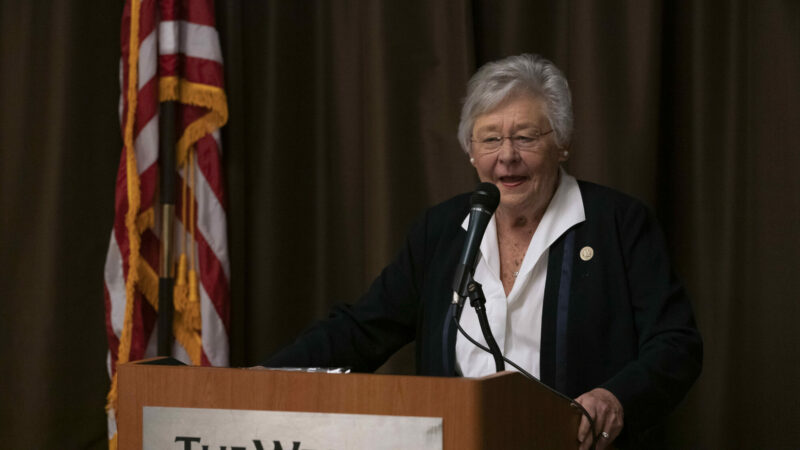Alabama says vaccine mandate will lead state employees to quit
By Kim Chandler
MONTGOMERY, Ala. (AP) — Alabama argued in a lawsuit challenging the federal vaccine requirements that many university and state agency employees would leave their jobs if required to get vaccinated against COVID-19.
Alabama joined with a coalition of other states in a lawsuit filed late Friday challenging the vaccine mandate on federal contractors. The lawsuit is part of Republican-led efforts to oppose the federal requirements. Alabama Attorney General Steve Marshall this week also urged businesses, universities and state agencies to consider employees’ requests for medical and religious exemptions.
“From the moment the White House tried to force this vaccine on to Americans, I have said that Alabama is standing strong against it and that the way to stop this is to go to the courts,” Alabama Gov. Kay Ivey said in a statement this weekend.
Alabama has one of the lowest vaccination rates in the country with just 44.7% of the population fully vaccinated, compared to a national average of 58%. In announcing the rules in September, President Joe Biden said the unvaccinated were hindering the nation’s recovery.
“Without vaccination requirements, we face endless months of chaos in our hospitals, further detrimental impacts on our economy, and anxiety in our schools. With them, we will accelerate our path out of the pandemic,” the White House wrote on a page about the requirements.
In the lawsuit filed late Friday, Alabama claimed that many university and Alabama Department of Public Health employees would “likely quit their jobs rather than receive the COVID-19 vaccine as a condition of further employment.”
Even as the state sues, Auburn University and the University of Alabama campuses have said employees must get vaccinated by Nov. 8 because the campuses all are federal contractors.
Vaccine mandates have already been the subject of litigation. The Supreme Court has rejected an emergency appeal from health care workers in Maine to block a vaccine mandate that went into effect Friday.
Many of Alabama’s public universities and some state agencies have received notice that they are subject to the federal-contractor vaccination mandate, according to the attorney general’s office.
Marshall issued an advisory this week instructing Alabama-based employers, including public university employers, to liberally interpret “in favor of the employee” any requests for medical and religious exemptions to the vaccination mandate.
When an employee requests a religious exemption, Marshall said state agencies should not “inquire into the validity of an employee’s religious beliefs, including the motives or reasons for holding the belief.” That deviates from federal guidance where federal employees are asked to participate in an interactive process and bring documentation supporting the request for an exemption.
Twelve bills related to vaccinations were introduced in the ongoing special session on redistricting, but key lawmakers said they do not expect to debate the proposals before the winter regular session.
House Speaker Mac McCutcheon said Republicans want to fight the mandate but suggested it would be counterproductive to pass legislation that couldn’t impact federal law. The U.S. Constitution’s supremacy clause is clear that federal law overrides any conflicting state laws.
“The last thing we want to do is have a knee jerk reaction on something that may sound good politically, but in substance what does it do. You haven’t done the people any justice by doing it that way,” McCutcheon said.
Businesses with federal contracts could be placed in a uncomfortable situation if torn between conflicting state and federal mandates. Some current mandates — such as a hospital requiring doctors to get yearly flu shots — could be impacted by the proposed bills.
Republican Sen. Arthur Orr of Decatur said there will be ongoing discussions about how to craft legislation that could help the state litigation. Orr said he is hearing more and more stories of people faced with losing their jobs because they are not vaccinated.
“It’s been tragic,” Orr said.
‘Sorry, Baby’ is a story about pain and healing you haven’t heard before
Eva Victor wrote, directed and stars in this tender film about a woman trying to make sense of life after sexual assault. Although very much a drama, Sorry, Baby showcases Victor's comic smarts.
Greetings from New Delhi, India, where performing monkeys spark delight — and ambivalence
Far-Flung Postcards is a weekly series in which NPR's international team shares moments from their lives and work around the world.
Israel strikes Syria’s capital Damascus
The Israel military said targets included a Syrian military compound in Damascus as well as a target near the Syrian presidential palace. Israel's defense minister said "painful strikes have begun."
The best games of 2025 so far, picked by NPR’s staff
From indies like Blue Prince to big console exclusives like Donkey Kong Bananza, NPR staff and contributors round up their favorite games of the year so far.
Israel strikes in Damascus as Syrian forces clash with Druze groups
The strike came as clashes continued in the southern Syrian city of Sweida after a ceasefire between government forces and Druze armed groups collapsed.
Even healthy brains decline with age. Here’s what you can do
Scientists are finding ways to minimize the effects of aging on the brain. Here are some ways to keep it healthy.








